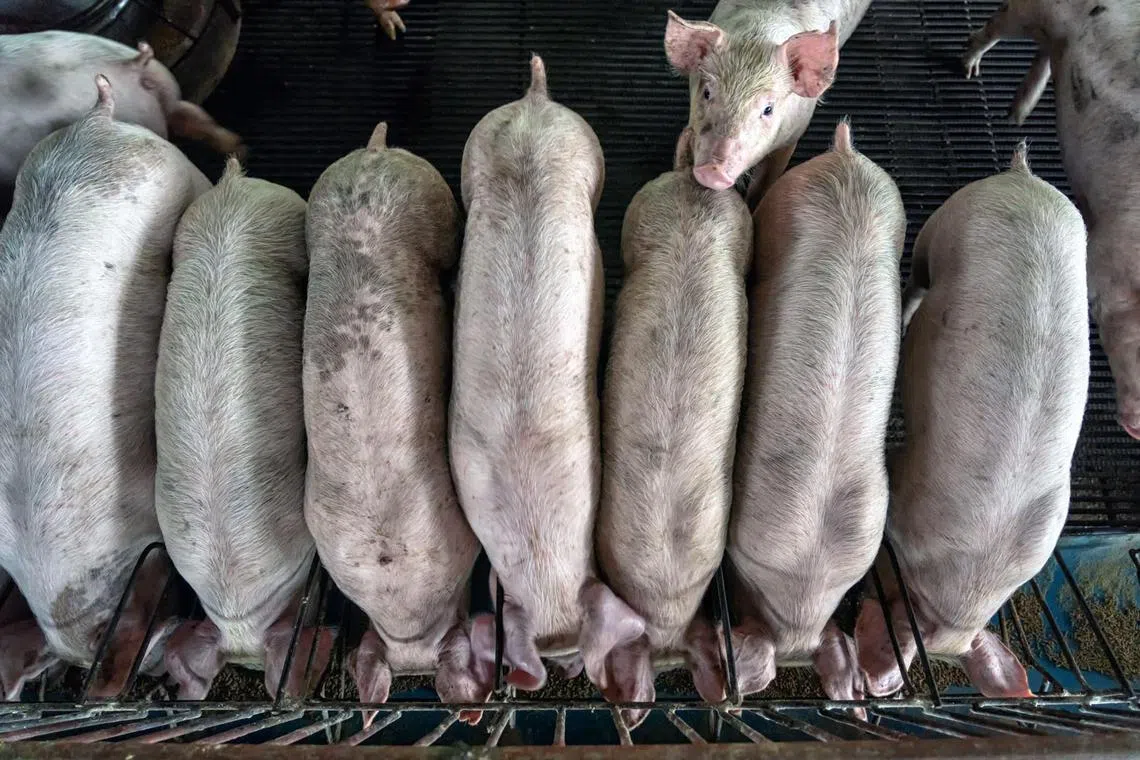Pigs at Indonesian farm that exported to S’pore confirmed to have African swine fever virus
Sign up now: Get insights on Asia's fast-moving developments

Infected pigs and those kept in the same cages have since been culled, the Indonesian authorities said.
PHOTO: SINGAPORE FOOD AGENCY
Follow topic:
JAKARTA – Pigs at an Indonesian farm that supplied livestock to Singapore were confirmed to have been infected with the African swine fever virus, the Indonesian authorities said on Tuesday.
The authorities tested pig samples from the farm on Pulau Bulan, in the Riau Islands province, after a consignment of live pigs sent to Singapore was found to be infected with the virus.
The virus was found in pig carcasses in April at an abattoir in Jurong
Mr Honismandri, the veterinary authority official at Riau Islands province, told The Straits Times that the pigs were likely to have been infected by a new strain of the African swine fever virus as their clinical symptoms differed slightly from those found in previous cases in North Sumatra and other parts of Indonesia.
“They did not have diarrhoea or experience bleeding,” said Mr Honismandri, whose name has only one word. “The pigs might have been infected by migrating boars or crows from other islands nearby.”
Singapore has stopped the import of live pigs from Pulau Bulan.
Mr Honismandri, who is also head of the livestock and animal health division at the province’s Food Security, Agriculture and Animal Health Agency, said the farm has been shut and all live pigs and fresh pork shipments from the island suspended since April 21.
Biosecurity measures have also been tightened on the island, and the movement of people and goods restricted, he added.
Infected pigs and those kept in the same cages have since been culled, Mr Honismandri said, adding that half of the 70,000 pigs on the Pulau Bulan farm are currently under lockdown to prevent further infections.
Pigs at the farm were vaccinated against another type of disease – the classical swine fever, also known as hog cholera – after they were infected in early 2022.
Both hog cholera and African swine fever have similar symptoms and can cause death in pigs. But, unlike for hog cholera, there is no vaccine against the African swine fever virus.
While African swine fever does not infect humans, it is highly contagious among wild boars and pigs.
Asked how long it would take for the farm to resume production and export, Mr Honismandri said it would likely take several months to bring in fresh supplies of livestock and to bring production levels back to normal.
“If the farm is clean within six months, and they then restock, or if existing pigs breed within two months, they can resume production and export in less than a year,” he said.
Mr Honismandri said Riau Islands’ veterinary authority has issued a circular to other regions in the province to caution them about the disease.
“We will also conduct surveillance and tests in pig farms across Riau Islands,” he said.
Owned by Indotirta Suaka – an agribusiness company that rears pigs and shrimps, among others, for export – the infected farm breeds 240,000 pigs on 1,500ha of land on Pulau Bulan, about 2.5km south-west of Batam.
The import of live pigs from Pulau Bulan island accounts for around 15 per cent of Singapore’s total pork supply.
That makes up about two-thirds of Singapore’s supply of freshly slaughtered pork.
The Singapore Food Agency (SFA) said in April that this was the first time African swine fever had been detected in pigs imported into the Republic.
Singapore buys pork from more than 20 sources,
The SFA requires regions exporting pork to Singapore to be free of African swine fever, which can be transmitted through raw meat from infected pigs.
Indonesia previously detected African swine fever in its pig population in December 2021, at a small farm in Nongsa, Batam. About 1,200 pigs were culled then to curb the spread of the disease.
In 2019, the country experienced a massive outbreak of the same disease in North Sumatra, where thousands of pigs died.


